Vote2017 - German elections and the Energiewende
Energy and climate policy in Germany's election
Contents
The latest developments
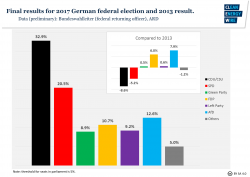 The Clean Energy Wire traces the progress of forming a new government alliance in this coalition watch. CLEW has been following the news on all energy and climate related developments of the general election campaign. Find in chronological order a list of all News Digest entries with the #Elections & Politics tag here and follow CLEW's live coverage on Twitter @cleanenergywire.
The Clean Energy Wire traces the progress of forming a new government alliance in this coalition watch. CLEW has been following the news on all energy and climate related developments of the general election campaign. Find in chronological order a list of all News Digest entries with the #Elections & Politics tag here and follow CLEW's live coverage on Twitter @cleanenergywire.
Merkel: 2020 climate target plays big role in upcoming coalition talks
German Chancellor Angela Merkel said she does not give up the government’s goal to reduce CO₂ emissions by 40 percent by 2020, which would “play a big role” in the upcoming talks to form a new government coalition. Germany’s broad consensus on a gradual exit from hard coal mining over the past decades could serve as a blueprint for a future lignite phase-out, she told a conference by Germany’s largest mining trade union.
CDU & Greens' energy politicians clash over Germany's coal exit speed
One week before the start of exploratory talks on forming a government coalition, aspiring German government alliance partners CDU and the Green Party agree that the country will have to phase out coal-fired power production. Yet, two of the parties’ energy representatives argued over its speed and shape at an event in Berlin.
German Greens confident pro-climate government coalition possible
Leading Green politicians in Germany are optimistic an agreement to improve the country’s patchy climate record is possible in likely coalition talks with Angela Merkel’s conservatives and the free-market FDP.
Vote in No.1 wind power state stalls Germany’s coalition talks
As Germany digests the result of this year’s federal election, the country prepares for yet another important vote, this time in the state of Lower Saxony. The early election in the country’s number one wind power state is seen as vital marker on the road to a new federal government.
Weakened Merkel set to seek coalition talks with Greens, FDP
Despite heavy losses in Germany's parliamentary elections, Angela Merkel is poised to stay Chancellor for another four years. The voters’ decision sets her conservative CDU/CSU party alliance on course for coalition talks with the Green Party and the Free Democrats as the SPD ruled out continuing the so-called grand coalition. Talks for what would become Germany’s first three-party-government are likely to become difficult. However, a strengthened Green Party is likely to push for stepping up Germany's climate protection efforts.
Climate & energy stumbling blocks for Jamaica-coalition talks
Germany might be headed towards a new chapter in its political history with a governing coalition of the conservative CDU/CSU alliance, the economic liberal FDP, and the environmentalist Green Party looming as a real prospect for the first time ever. But turning a so-called 'Jamaica' coalition into reality might prove difficult as the parties involved traditionally stand for diverging political philosophies in many policy areas. CLEW reviews the potential coalition’s biggest energy & climate stumbling blocks.
The long road to a new government coalition in Germany
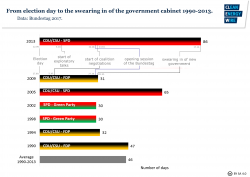 Officially, the new German government is formed after the new federal parliament decides on a chancellor, but the laborious process starts much sooner. German voters expect a period of coalition talks and negotiations to follow an election. These could take longer than usual this time around, with more parties involved in the talks and the Lower Saxony state election likely to prevent early commitments. The Clean Energy Wire explains the negotiation process and provides a brief overview of the path to the next German government.
Officially, the new German government is formed after the new federal parliament decides on a chancellor, but the laborious process starts much sooner. German voters expect a period of coalition talks and negotiations to follow an election. These could take longer than usual this time around, with more parties involved in the talks and the Lower Saxony state election likely to prevent early commitments. The Clean Energy Wire explains the negotiation process and provides a brief overview of the path to the next German government.
All must compromise in coalition talks, also on climate - Merkel ally
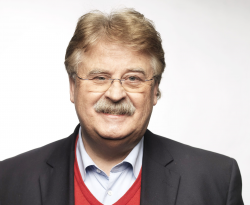 A ‘Jamaica’ coalition between the CDU/CSU, the FDP and the Greens is currently the only realistic scenario for a stable government in Germany, and all parties must compromise to prevent “dreadful” new elections, says long-time Merkel ally Elmar Brok, former head of the European Parliament’s committee on foreign affairs, who was also part of the CDU/CSU team during the coalition talks in 2013. After the 24 September general election, the future course of Germany’s climate and energy policy crucially depends on the agreement the parties can reach. The Clean Energy Wire talks to leading politicians about their perspective on the coalition negotiations.
A ‘Jamaica’ coalition between the CDU/CSU, the FDP and the Greens is currently the only realistic scenario for a stable government in Germany, and all parties must compromise to prevent “dreadful” new elections, says long-time Merkel ally Elmar Brok, former head of the European Parliament’s committee on foreign affairs, who was also part of the CDU/CSU team during the coalition talks in 2013. After the 24 September general election, the future course of Germany’s climate and energy policy crucially depends on the agreement the parties can reach. The Clean Energy Wire talks to leading politicians about their perspective on the coalition negotiations.
The run up to the election on 24 September:
German election to define speed and shape of energy transition
With Germans about to cast their votes in the federal election, Chancellor Angela Merkel is virtually certain to retain power. But the make-up of the next coalition will be key to how the new government tackles a host of energy and climate challenges - not least Germany’s success or failure to meet its own 2020 emissions reduction goals. Read CLEW's election preview here.
Campaign quotes: What Merkel & Schulz say about Energiewende issues
 Chancellor Angela Merkel promises more precise climate goals after the elections; contender Martin Schulz calls for a binding e-car quota. In the run-up to the federal elections in Germany on 24 September, CLEW presents key campaign quotes on energy and climate from the two largest parties' candidates.
Chancellor Angela Merkel promises more precise climate goals after the elections; contender Martin Schulz calls for a binding e-car quota. In the run-up to the federal elections in Germany on 24 September, CLEW presents key campaign quotes on energy and climate from the two largest parties' candidates.
Campaign quotes: Greens and Free Democrats on Energiewende issues
 The Free Democrats (FDP) want a more market-led Energiewende and abolish "dreadful subsidies" to renewables, while the Green Party favours a CO2 tax and the phase-out of conventional cars. In the run-up to the federal election in Germany on 24 September, CLEW presents key campaign quotes on energy and climate from the candidates of the two parties that might join chancellor Merkel's conservative CDU in a government coalition, should the current "grand coalition" of CDU/CSU and SPD not be renewed.
The Free Democrats (FDP) want a more market-led Energiewende and abolish "dreadful subsidies" to renewables, while the Green Party favours a CO2 tax and the phase-out of conventional cars. In the run-up to the federal election in Germany on 24 September, CLEW presents key campaign quotes on energy and climate from the candidates of the two parties that might join chancellor Merkel's conservative CDU in a government coalition, should the current "grand coalition" of CDU/CSU and SPD not be renewed.
German parties' energy & climate policy positions
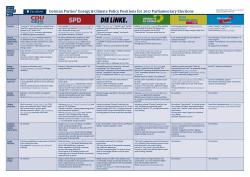 See where Germany's six largest parties stand on coal, e-cars, renewables and other climate and energy topics in this factsheet.
See where Germany's six largest parties stand on coal, e-cars, renewables and other climate and energy topics in this factsheet.
Colour codes: How energy & climate policy differs in German coalitions
The next German government is almost certain to be a coalition of two or more parties. That means the country’s energy and climate policy will be a compromise between different party priorities. See how this will likely affect Energiewende policy of the next four years in this factsheet.
#btw17 - Reporting on the general elections in Germany
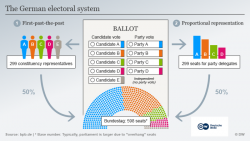 The Clean Energy Wire has compiled contacts, links and an explanation of the voting system to help journalists report on Germany’s 2017 federal elections in this factsheet.
The Clean Energy Wire has compiled contacts, links and an explanation of the voting system to help journalists report on Germany’s 2017 federal elections in this factsheet.
What energy & climate stakeholders want from Germany's next government
 Environmentalists, business associations, lobby groups, think tanks and researchers have all drawn up their wish list for future energy and climate policy ahead of the federal elections on 24 September. Whatever coalition German Chancellor Angela Merkel – widely tipped to win a fourth term – will form, those stakeholders will push hard to get their ideas for the Energiewende in the coalition agreement and high on to the next government’s agenda. The Clean Energy Wire has selected key requests from relevant stakeholders in this factsheet.
Environmentalists, business associations, lobby groups, think tanks and researchers have all drawn up their wish list for future energy and climate policy ahead of the federal elections on 24 September. Whatever coalition German Chancellor Angela Merkel – widely tipped to win a fourth term – will form, those stakeholders will push hard to get their ideas for the Energiewende in the coalition agreement and high on to the next government’s agenda. The Clean Energy Wire has selected key requests from relevant stakeholders in this factsheet.
Dieselgate and climate fears fail to ignite voters' passion - pollster
Protecting the climate has become so commonplace among Germany's political parties that it is hard for one of them to stand out on an environmentalist platform, says Torsten Schneider-Haase of German opinion polling company Kantar Emnid. In the CLEW interview, the pollster explains why Germans care about the Energiewende's success and yet are unlikely to base their voting decision on it at the upcoming parliamentary elections.
Ignore 'red line' campaign talk on energy and climate – analyst
 The scope of the next government's ambition for the Energiewende depends on the constellation of its coalition, says Arne Jungjohann, energy policy analyst and Green Party member, although the shift to a renewables-based economy is not at stake. In an interview with Clean Energy Wire, Jungjohann talks about controversial issues, voter mobilisation and red lines one week ahead of the vote.
The scope of the next government's ambition for the Energiewende depends on the constellation of its coalition, says Arne Jungjohann, energy policy analyst and Green Party member, although the shift to a renewables-based economy is not at stake. In an interview with Clean Energy Wire, Jungjohann talks about controversial issues, voter mobilisation and red lines one week ahead of the vote.
'Parties unlikely to draw energy policy red lines in coalition talks'
 German voters head to the polls on 24 September to decide the make-up of the federal parliament. The next step, however – forming a government – could take weeks, if not months. Germany’s party landscape has become more fragmented, which means that the traditional two-party alliances might not reach the necessary parliamentary majority anymore. CLEW spoke to Senior Research Fellow at the Mannheim Centre for European Social Research (MZES) Christian Stecker about possible government coalitions and the policy differences that could complicate negotiations.
German voters head to the polls on 24 September to decide the make-up of the federal parliament. The next step, however – forming a government – could take weeks, if not months. Germany’s party landscape has become more fragmented, which means that the traditional two-party alliances might not reach the necessary parliamentary majority anymore. CLEW spoke to Senior Research Fellow at the Mannheim Centre for European Social Research (MZES) Christian Stecker about possible government coalitions and the policy differences that could complicate negotiations.
Merkel’s grand coalition in review: The climate and energy record
 As the current legislative period draws to a close, The Clean Energy Wire asked key stakeholders to review the last four years of German energy and climate policy – and tell us what they would like to see from the next government.
As the current legislative period draws to a close, The Clean Energy Wire asked key stakeholders to review the last four years of German energy and climate policy – and tell us what they would like to see from the next government.
The debate over an end to combustion engines in Germany
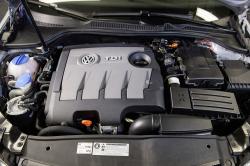 Cartel allegations against Germany’s major carmakers and looming inner city driving bans for older diesel cars have turned the future of the internal combustion engine car into one of the few campaign hot topics for the upcoming general elections. Surveys show that Germans are losing trust in both the diesel technology and the car industry, but environmental questions rank relatively low among topics crucial for the voter decision. The Clean Energy Wire provides key quotes from German politicians, their parties' national election programmes, and industry players on the future of the combustion engine.
Cartel allegations against Germany’s major carmakers and looming inner city driving bans for older diesel cars have turned the future of the internal combustion engine car into one of the few campaign hot topics for the upcoming general elections. Surveys show that Germans are losing trust in both the diesel technology and the car industry, but environmental questions rank relatively low among topics crucial for the voter decision. The Clean Energy Wire provides key quotes from German politicians, their parties' national election programmes, and industry players on the future of the combustion engine.
The road to the next Energiewende government
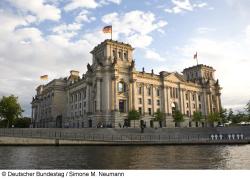 This factsheet provides an overview of relevant events over the coming months, and will be updated as new dates are set.
This factsheet provides an overview of relevant events over the coming months, and will be updated as new dates are set.
Party election programmes
Conservatives' election programme sticks to national climate goals
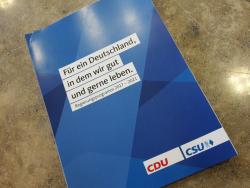 The conservative alliance of German Chancellor Angela Merkel’s CDU and its Bavarian sister party CSU has pledged to stick to the country’s national climate targets, including the long fought-over Climate Action Plan 2050, in the two parties’ joint programme for September’s federal election. See the full programme here.
The conservative alliance of German Chancellor Angela Merkel’s CDU and its Bavarian sister party CSU has pledged to stick to the country’s national climate targets, including the long fought-over Climate Action Plan 2050, in the two parties’ joint programme for September’s federal election. See the full programme here.
SPD election programme draft includes CO₂ floor price, climate protection law
 The Social Democratic Party (SPD) wants to develop a national climate protection law and possibly start negotiations to agree minimum prices for CO₂ on a European level, the party says in its federal election campaign programme. See the full programme here.
The Social Democratic Party (SPD) wants to develop a national climate protection law and possibly start negotiations to agree minimum prices for CO₂ on a European level, the party says in its federal election campaign programme. See the full programme here.
"End the sustained subsidies system of the EEG”
 The German Free Democratic Party (FDP) wants to “end the sustained subsidies system of the [Renewable Energy Act] EEG” with its priority grid access and feed-in tariffs for renewables, the party writes in its programme for the autumn general elections. See the full programme here.
The German Free Democratic Party (FDP) wants to “end the sustained subsidies system of the [Renewable Energy Act] EEG” with its priority grid access and feed-in tariffs for renewables, the party writes in its programme for the autumn general elections. See the full programme here.
“Investing in renewable energy, disempowering energy corporations”
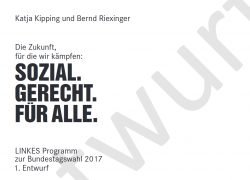 In its federal election campaign programme, the Left Party advocates the “socially fair ecologic transition created by the people in a democratic way”, with renewable energies, a coal exit, ecologic mobility, climate protection, a sustainable economy and the fight against energy poverty at the core. See the full programme here.
In its federal election campaign programme, the Left Party advocates the “socially fair ecologic transition created by the people in a democratic way”, with renewable energies, a coal exit, ecologic mobility, climate protection, a sustainable economy and the fight against energy poverty at the core. See the full programme here.
The Green Party's draft election programme - a first look
 The Green Party's election programme focuses on the “ecological modernisation” of Germany. In the run-up to September’s parliamentary elections, the Greens set out their aims of reinvigorating renewables development, giving up coal and weaning heating and transportation of fossil fuels. See the full programme here.
The Green Party's election programme focuses on the “ecological modernisation” of Germany. In the run-up to September’s parliamentary elections, the Greens set out their aims of reinvigorating renewables development, giving up coal and weaning heating and transportation of fossil fuels. See the full programme here.
Ending the project decarbonisation and abolishing the Climate Action Plan 2050
 The right-wing party Alternative for Germany (AfD) questions the scientific consensus that climate change is mainly caused by humans, wants the country to exit the Paris Climate Agreement and abolish the recently adopted Climate Action Plan 2050, according to the its campaign programme for the upcoming federal elections. See the full programme here.
The right-wing party Alternative for Germany (AfD) questions the scientific consensus that climate change is mainly caused by humans, wants the country to exit the Paris Climate Agreement and abolish the recently adopted Climate Action Plan 2050, according to the its campaign programme for the upcoming federal elections. See the full programme here.
Party interviews
"Conditions for a coal exit are lacking"
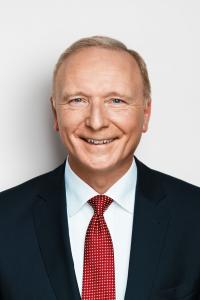 Germany currently does not have the necessary conditions to set a clear target date for exiting coal, says the SPD's energy spokesman Bernd Westphal. Read the interview here.
Germany currently does not have the necessary conditions to set a clear target date for exiting coal, says the SPD's energy spokesman Bernd Westphal. Read the interview here.
“There’s no way around a coal exit law”
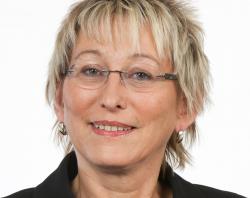 Eva Bulling-Schröter, Member of the German Bundestag and spokesperson for energy and climate policy for the Left Party’s parliamentary group, talks to CLEW about her party’s climate and energy policy.
Eva Bulling-Schröter, Member of the German Bundestag and spokesperson for energy and climate policy for the Left Party’s parliamentary group, talks to CLEW about her party’s climate and energy policy.
"We’re not here to protect German carmakers"
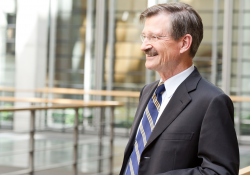 says Hermann Otto Solms, energy expert of the Free Democratic Party (FDP). Find out more about the party's energy policy ambitions in this interview.
says Hermann Otto Solms, energy expert of the Free Democratic Party (FDP). Find out more about the party's energy policy ambitions in this interview.
"We will have to talk about a gradual end to renewables support."
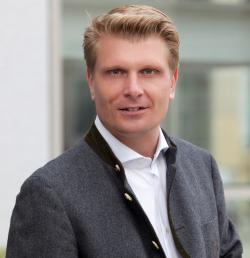 says Thomas Bareiß, Member of the German Bundestag and Representative for Energy Policy of the CDU/CSU Parliamentary Group. Read the interview here.
says Thomas Bareiß, Member of the German Bundestag and Representative for Energy Policy of the CDU/CSU Parliamentary Group. Read the interview here.
"We have to deliver on the Paris targets"
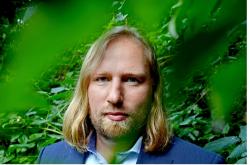 says Anton Hofreiter, chairman of the German Greens' parliamentary group. Read the interview here.
says Anton Hofreiter, chairman of the German Greens' parliamentary group. Read the interview here.
Stories
Efficient sector coupling and digitalisation post-election key topics
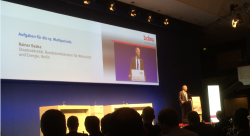 Many aspects of energy policy will have to be pursued regardless of which party prevails in elections, says Rainer Baake, State Secretary in the Federal Ministry for Economic Affairs and Energy (BMWi). Read the article here.
Many aspects of energy policy will have to be pursued regardless of which party prevails in elections, says Rainer Baake, State Secretary in the Federal Ministry for Economic Affairs and Energy (BMWi). Read the article here.
Merkel shuns energy, climate at party conference focused on security, migration
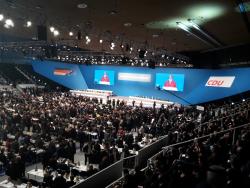 Chancellor Angela Merkel and her party left energy and climate policy on the sidelines at the Christian Democratic Union’s (CDU) conference in Essen. Read the full story here.
Chancellor Angela Merkel and her party left energy and climate policy on the sidelines at the Christian Democratic Union’s (CDU) conference in Essen. Read the full story here.
German Greens to make coal exit, fossil car ban an election focus
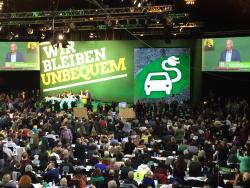 Banning combustion engines inand exiting coal-fired power production are likely to be two key Green Party demands in the general elections. Although the party won’t adopt a final programme before summer, the party convention's results will serve as guidelines for 2017.
Banning combustion engines inand exiting coal-fired power production are likely to be two key Green Party demands in the general elections. Although the party won’t adopt a final programme before summer, the party convention's results will serve as guidelines for 2017.
